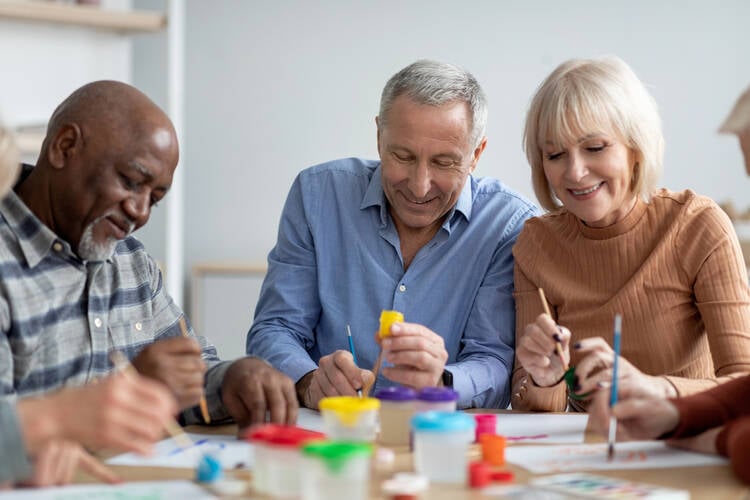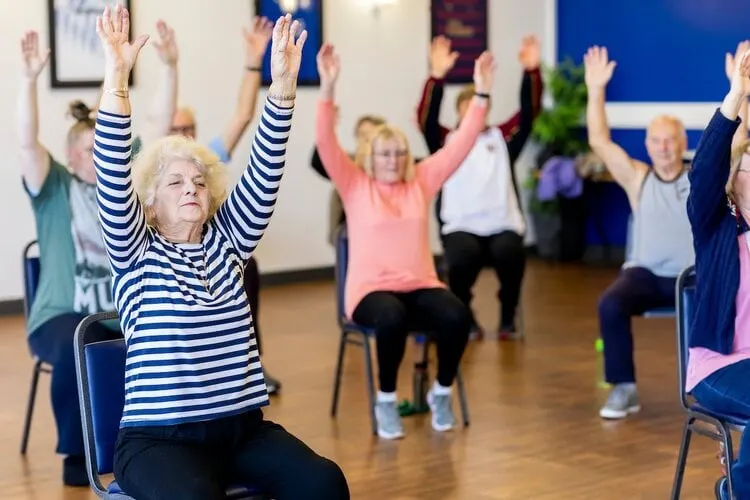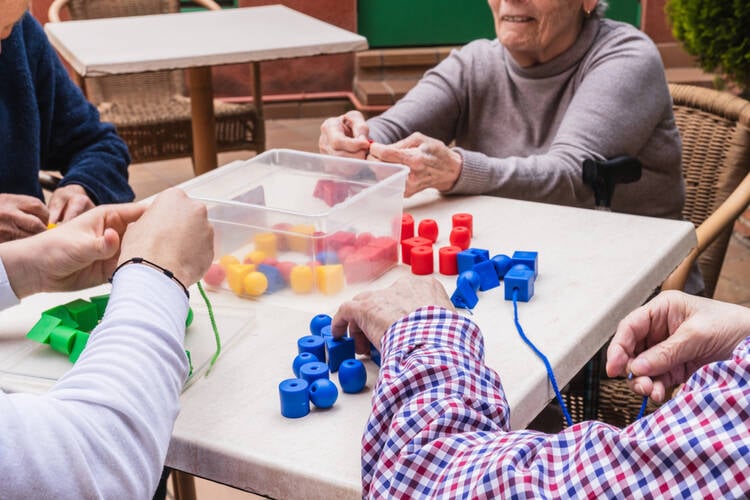
One of the most effective ways to keep seniors in your assisted living facility healthy, active, and mentally stimulated is by engaging them in a variety of activities and games.
Participating in well-designed activities helps seniors maintain physical mobility, improve cognitive function, and reduce feelings of isolation or boredom.
Activities can range from light exercises and interactive games to creative hobbies, all of which contribute to emotional well-being and social interaction.
In this article, we will explore some of the best activities and games for seniors in assisted living facilities.
These ideas are designed to promote mental stimulation, physical health, and social connection.
Whether you are looking for individual activities or group-based games, the suggestions provided can help improve quality of life, encourage participation, and create a lively, enjoyable environment for residents.
Best Activities and Games for Seniors in Assisted Living
-
Chair Yoga

Chair yoga is a gentle form of exercise tailored for seniors with limited mobility.
It helps improve flexibility, balance, and circulation without putting stress on the joints.
Instructors guide residents through stretches, breathing exercises, and light movements while seated.
This activity promotes relaxation, reduces stress, and encourages social interaction when done in groups.
Additionally, chair yoga can help manage chronic pain, improve posture, and enhance overall mental well-being.
-
Memory Games
Memory games stimulate cognitive function and help delay mental decline. Activities such as matching card games, memory bingo, or recalling sequences encourage residents to focus, process information, and engage their minds.
These games can be played individually or in groups, fostering both mental sharpness and social interaction.
Regular participation in memory-enhancing activities can improve concentration, boost confidence, and provide a fun challenge for seniors.
Incorporating memory games into a weekly schedule keeps residents mentally active.
-
Arts and Crafts

Arts and crafts allow seniors to express creativity while improving fine motor skills.
Activities can include painting, knitting, scrapbooking, pottery, or seasonal decorations.
These projects encourage problem-solving, concentration, and self-expression, fostering a sense of accomplishment.
Group craft sessions also promote socialization and collaboration, helping residents build friendships.
Displaying completed artwork in communal areas can boost confidence and create a lively, personalized environment.
-
Puzzles
Puzzles, such as jigsaw puzzles, crossword puzzles, and Sudoku, are excellent for stimulating the brain and enhancing problem-solving skills.
They help seniors improve memory, concentration, and visual-spatial reasoning.
Group puzzle sessions also encourage teamwork and social interaction, making them a fun, shared activity.
Completing puzzles offers a sense of accomplishment, boosts self-esteem, and provides mental satisfaction.
Puzzles can be adapted to varying difficulty levels to suit different cognitive abilities.
Including puzzles in a daily or weekly schedule keeps residents engaged, challenges their minds, and supports overall cognitive health.
-
Board Games
Games like Scrabble, Monopoly, or checkers encourage strategic thinking, problem-solving, and memory skills.
Playing in groups also helps residents build relationships, communicate effectively, and enjoy friendly competition.
Board games can be adapted to suit varying mobility or cognitive levels, making them accessible to most seniors.
Hosting regular game sessions adds structure to daily routines and promotes laughter, fun, and camaraderie.
Engaging in board games helps residents stay mentally active while strengthening social bonds.
-
Music Therapy
Music therapy uses singing, playing instruments, or listening to music to stimulate memory, reduce stress, and improve mood.
Familiar songs can evoke positive memories and enhance emotional well-being.
Group sing-alongs encourage participation, social bonding, and a sense of community.
Music therapy has been shown to improve cognitive function, reduce agitation, and provide relaxation for seniors with dementia or Alzheimer’s.
Instruments like tambourines or hand drums allow residents to engage physically and creatively. Incorporating regular music sessions provides both entertainment and
-
Gardening
Gardening is a therapeutic activity that combines physical movement, sensory stimulation, and mental engagement.
Planting flowers, herbs, or vegetables encourages light exercise, improves fine motor skills, and fosters a sense of responsibility.
Gardening also promotes relaxation, reduces stress, and boosts mood through exposure to nature.
Group gardening activities encourage teamwork and social interaction, while tending to plants gives residents a sense of accomplishment.
Indoor gardening projects, such as potted plants or small herb gardens, can be adapted for limited mobility.
-
Gentle Exercise Classes
Gentle exercise classes, including stretching, tai chi, or low-impact aerobics, help seniors maintain mobility, strength, and balance.
These classes reduce the risk of falls, improve circulation, and enhance overall health.
Group exercises foster social interaction, encourage participation, and create a sense of routine.
Instructors can adapt exercises to individual abilities, ensuring safety and comfort.
Regular physical activity improves energy levels, reduces stiffness, and promotes mental well-being.
-
Cooking and Baking Activities
Cooking and baking provide both a creative outlet and a practical skill-building activity for seniors.
Simple recipes, such as cookies, muffins, or salads, encourage participation, fine motor coordination, and cognitive engagement.
Group cooking sessions promote teamwork, conversation, and social bonding.
Residents can enjoy the results of their efforts, which adds a sense of satisfaction and accomplishment.
Adapt recipes for dietary restrictions and mobility needs to ensure safety and accessibility.
-
Storytelling and Reminiscence Sessions
This activity stimulates cognitive function, memory recall, and verbal communication skills.
Group reminiscence fosters social interaction, strengthens relationships, and helps residents feel valued and heard.
Using props, photos, or themed prompts can enhance engagement and make sessions more interactive.
Storytelling also supports emotional well-being by providing a safe space for self-expression.
Regular storytelling or memory-sharing activities help maintain mental sharpness, create meaningful connections, and give residents an enjoyable and purposeful way to reflect on their lives while connecting with others.
-
Bingo
Bingo is a classic group game that promotes social interaction, mental alertness, and fun competition.
It’s easy to learn, adaptable for different mobility levels, and can be customized with themed cards or prizes.
Playing bingo encourages focus, number recognition, and friendly conversation among participants.
Offering small rewards or themed events, such as holiday bingo, adds motivation and engagement.
Regular bingo sessions are a simple yet effective way to combine entertainment, cognitive stimulation, and socialization in assisted living facilities.
-
Movie Nights
Choose films that are easy to follow, nostalgic, or related to popular genres among residents.
Arrange comfortable seating, popcorn, and beverages to enhance the experience.
Movie nights encourage discussion and bonding afterward, fostering a sense of community.
This activity can also include themed events, such as classic films or holiday specials, to create anticipation and excitement.
By combining leisure, conversation, and shared enjoyment, movie nights support mental well-being, reduce feelings of isolation, and offer a simple way for seniors to unwind.
-
Card Games
Card games like solitaire, bridge, rummy, or Go Fish are excellent for mental stimulation and social interaction.
They encourage strategic thinking, memory recall, and concentration. Group card sessions foster camaraderie, friendly competition, and teamwork.
Cards are accessible, require minimal equipment, and can be adapted for varying cognitive and mobility levels.
Teaching new games also provides a learning challenge, keeping residents engaged.
Regularly scheduled card games help residents build routines, socialize, and stay mentally active.
-
Trivia Games
Trivia games challenge seniors’ knowledge, memory, and recall while encouraging friendly competition.
Topics can range from history, sports, movies, or general knowledge, allowing participants to showcase their expertise.
Group trivia sessions promote conversation, teamwork, and social engagement.
Hosting themed trivia nights, such as decades-focused or holiday-related questions, adds excitement and variety. Prizes or small rewards provide additional motivation.
-
Walking Clubs
Organized walking clubs encourage physical activity, mobility, and social interaction.
Walking outdoors or around the facility’s safe spaces improves cardiovascular health, circulation, and muscle strength.
Group walks create opportunities for conversation, friendship, and shared enjoyment of nature.
Walking clubs can include themed routes, step challenges, or social gatherings afterward to increase engagement.
The activity also promotes mental well-being, as physical exercise releases endorphins and reduces stress.
Walking clubs are adaptable to different mobility levels, allowing residents to participate safely.
-
Pet Therapy
Interacting with therapy animals provides emotional support, reduces stress, and promotes happiness.
Pet therapy sessions can include visits from dogs, cats, or other small animals, allowing seniors to pet, play, or simply enjoy companionship.
Animals encourage social interaction, conversation, and a sense of comfort and calm.
Pet therapy has been shown to reduce anxiety, lower blood pressure, and improve mood in seniors.
Group sessions foster community engagement, while individual interactions provide personal connection.
-
Bowling Games
Indoor or tabletop bowling is a fun, low-impact physical activity that promotes coordination, strength, and balance.
Using lightweight pins and balls makes it accessible for seniors with varying mobility levels.
Bowling encourages friendly competition, social interaction, and teamwork when played in groups.
Regular bowling sessions help maintain physical activity, enhance motor skills, and provide entertainment.
Adding themed or seasonal tournaments creates excitement and anticipation, making it a versatile and enjoyable activity.
-
Dancing and Movement Classes
Low-impact options like line dancing, ballroom, or seated dance exercises improve balance, coordination, and cardiovascular health.
Group sessions foster camaraderie, encourage laughter, and provide a sense of accomplishment.
Dancing also stimulates the brain through memorization of steps and sequences.
Music enhances emotional well-being, reducing stress and promoting joy. Classes can be adapted for varying mobility levels, ensuring everyone can participate safely.
Regular dance activities help seniors stay active, boost energy, and connect socially.
-
Sensory Activities
Sensory activities engage multiple senses to promote mental stimulation, relaxation, and emotional well-being.
Examples include scented oils, textured fabrics, water tables, or tactile art projects.
These activities are especially beneficial for seniors with dementia or cognitive impairments, as they encourage exploration, memory recall, and engagement.
Group sessions foster social interaction, while individual activities offer personal enjoyment.
Incorporating sensory exercises regularly helps maintain cognitive function, supports emotional health, and provides a meaningful, multi-sensory experience that enriches daily life for seniors in assisted living facilities.
-
Book Clubs
Residents can choose a book to read over a set period, followed by group discussions to share insights, opinions, and reflections.
This activity stimulates cognitive function, improves comprehension, and promotes critical thinking.
Book clubs also provide opportunities for conversation, connection, and building friendships.
Including themed readings, audiobooks, or large-print options ensures accessibility for all participants.
Regular book club sessions foster a sense of community, provide mental stimulation, and create enjoyable shared experiences.
